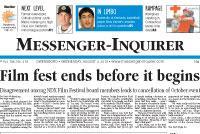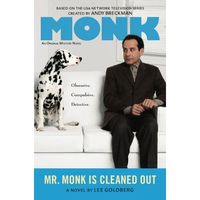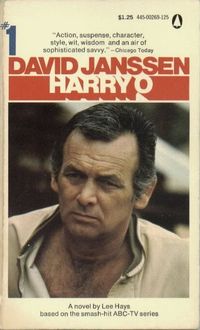 This Chinese "straddling bus" looks super-cool and super-smart and ec0-friendly. They ought to think about it in Los Angeles. The bus "straddles" the roadway and passes over traffic and is far cheaper to produce than a subway.
This Chinese "straddling bus" looks super-cool and super-smart and ec0-friendly. They ought to think about it in Los Angeles. The bus "straddles" the roadway and passes over traffic and is far cheaper to produce than a subway.
Harry O Tie-Ins
What is best TV private eye show? For me, it's a tie between David Janssen's HARRY O and James Garner's THE ROCKFORD FILES… with Darren McGavin's THE OUTSIDER coming in a close second. The plots on HARRY O were often lousy, but the pleasure of watching Janssen's portrayal and listening to the crisp dialogue (and, in the first season, the voice-overs) more than made up for it. HARRY O is definitely the most "literary" of the three …by that I mean that it was the show that came closest to capturing the feeling of reading a detective novel. Perhaps that's why I was so disappointed in the HARRY O tie-in novels, one of which is reviewed today over on the Vintage Hardboiled Reads blog. He says, in part:
This "Harry O" paperback is far from being a great crime novel, but as a huge fan of the series I did enjoy it. I would say that the characterization of Harry Orwell in the story is fairly close to the TV one. The spoken narrative on the show is definitely much better. And the book didn't capture that lonely, somber persona that David Janssen was able to deliver. I'll chalk that up as something that is difficult for a tie-in author to do. The writing is straightforward and the plot though interesting, wasn't too difficult to figure out. Even with the similarities of Hammett's Casper Gutman, I would of liked to have seen more of the Sydney Jerome character. He came off as the most colorful of all in the story. All-in-all, it still was a fun quick read for me. If you were a fan of the TV series, I'm sure you would get a kick out of this novel also.
And, just for the fun of it, here's the HARRY O main title from the second half of season one (I'll use any excuse to watch it again).
Mrs Potato Head is Back…Again
Lady Sybilla, the dimwit who tried to sell her own TWILIGHT sequels on eBay, is back. Now's she's self-published RUSSET NOON through CreateSpace and is offering her swill on Amazon as a "parody" in a pathetic and transparent attempt not to get slapped with a cease-and-desist order. The product description of her craptastic opus clearly indicates that it's not a parody…but a lame attempt to sell a sequel to a book, and characters, she doesn't own. This delusional fanficcer must have studied at the feet of the master, Lori Jareo.
(Thanks to C.S. Winchester for the heads-up)
UPDATE 8-10-2010: No surprise: Faster than you can say "Lori Jareo, " delusional fanficcer Lady Sybilla's self-published TWILIGHT sequel RUSSET NOON has been yanked off of Amazon. It's also now "on hold" on CreateSpace.
Remaindered In the News

REMAINDERED was the good news/bright side in an article in today's Owensboro Messenger-Inquirer about the unfortunate cancellation of the NDX Film Festival. The article said, in part:
Though the festival has been canceled, a short movie will still be filmed in Owensboro in September.
"Remaindered" was written and will be directed by Lee Goldberg, a veteran TV writer, author and member of the Mystery Writers of America. The film was set to premiere during the NDX Film Festival.
"Remaindered" is about a once famous and successful author who is on a downward spiral in his career and in the midst of a self-funded book tour. The movie takes its name from the term for a book being relegated to a store's bargain bin. Students taking classes in the recently created theater arts degree program will have the chance to participate in the filming.
Newton said he and Goldberg hope to show "Remaindered" and "Murder in Kentucky," a short movie filmed during the 2009 International Mystery Writers Festival, in October at the RiverPark Center. A round-table discussion about filmmaking and what filmmakers learned from the two movies would then be held, Newton said.
Roxi Witt, general manager of the RiverPark Center, wrote in an e-mail that RiverPark staff members need to discuss the possible showings with its board of directors at this month's meeting."
Attention K-Mart Shoppers
In REMAINDERED, the short film I will be directing in September in Kentucky, the central character is a once-successful writer now on a self-funded book tour through rural America, signing at K-Marts and stores like it. The story unfolds at two discount stores and a house. We've locked down the house location, but we are still looking for a discount store to shoot in (and that would double as two different stores). It hasn't been easy. We're only four weeks from filming and a couple of possibilities have emerged… but the uncertainty is driving me nuts.
I suspect whatever location we end up at will require some adjustments to the script and some cheating. For example, one possible location is an office equipment store…which makes no sense at all story-wise. But if I use an establishing shot of a discount store, and then shoot tight in one corner, and have a bunch of people pushing shopping carts filled with groceries, garden items, etc. past where my protagonist is signing books, I might be able to sell the notion that we are in a K-Mart or Save-A-Lot…and not in an office equipment place.
But I sure hope it doesn't come to that…
The Triumphant Return Of The Goldberg Brothers Band…Plus A Rabkin
 From my brother Tod's blog…
From my brother Tod's blog…
Yes, the rumors you've heard are true: My brother Lee and I are putting the Goldberg Brothers Band back together for a limited engagement summer tour. We'll be playing all of our hits, a bunch of the B-sides you used to love, the songs with the backward masking and, of course, we intend to do our patented Hot August Night show where we cover, in full, Neil Diamond's original live album of the same name. And despite Lee's late career marriage to Cher, his weight gain and the time he spent in prison for cutting a fan with his glass-beaded shirt, folks I swear he still rocks. It all starts this coming weekend and then all of August will be spent hitting some pretty major county fairs, parks with well-lit gazebos (Pioneer Park in Walla Walla, I'm talking to you!) and then one final night at the Cow Palace. Scorsese is filming that one for a concert film.
We'll be joined by William "Billy The Axe Man" Rabkin for a few dates, too, so keep your radio tuned to your favorite AM rock station for the details.
Here's where we'll be this coming weekend:
Saturday, Aug. 7th, 1pm
2940 Thousand Oaks Blvd.
Thousand Oaks, CA 91362
Lee will be signing his new Monk book (his 109th, I believe), Bill will be signing his new Pysch book, and I'll be signing my new Burn Notice book.
Saturday, Aug. 7th, 4pm
1306 Broxton Avenue
LA, CA 90024 (that's Westwood Village)
Same as above, but we'll have perfected our jokes and witty banter from the previous event.
Sunday, Aug. 8th, 1pm
7176 Edinger Avenue
Huntington Beach, CA
Just me and Lee this time. Bill has a parole hearing that day. This is a new store, so there's a good chance it will just be me and Lee and no one else, really. So if you've ever wanted to have a private conversation with us about, you know, whatever weird shit happens to be on your mind, this is your chance.
What to Wear…or Not

I’ve spent a lot of time tonight trading emails and photos back-and-forth with our two leads — Eric Altheide and Sebrina Siegel — discussing their wardrobe for the film.
Wardrobe is not my strong suit (no pun intended. Okay, maybe intended a little). And it can be awkward discussing what I’d like the actors to wear… or not wear…and what I’d like to see…and not see…in seduction and love scenes. It’s not so hard this time, since we aren’t going to actually see anybody making love, but it’s still a delicate topic, even when the nudity is more implied than seen. So tonight I talked about different kinds of briefs with Eric and the choices in bras, nighties, and the like with Sebrina. It was fine…and they immediately understood what I was going for.
It was more awkward for me when I exec-produced FAST TRACK, a TV movie/pilot I also wrote, and that we shot in Berlin a couple of years ago. In that film, we had two sex scenes…and a key dramatic moment centered on a guy catching his lover as she’s having an orgasm with another man. Discussing what we would see, what we wouldn’t see, and how the seduction and those scenes would be staged, was something new for me. And, to be honest, I worried about how I’d be able to discuss it with the actors.
But I knew exactly what I wanted, and what I needed, in order for the scenes to work dramatically and visually. And I figured that all I really had to do was convey that vision to the actors, and then the actual details (what to wear or not to wear, what to touch or not to touch, etc.) wouldn’t be so hard to discuss, because they would understood what I was going for, too. And that’s how it went. They trusted me… and I trusted them…and it turned out very well.
I can already tell that the same is going to be true for REMAINDERED.
Why I Love Harry Whittington
This Pulp Serenade review of PRAIRIE RAIDERS pretty much sums up why I love Harry Whittington’s books. They write, in part:
One of the hallmarks of a Harry Whittington book is a protagonist driven by an all-consuming obsession, a mission that rises above morality, a cause that is more important that their lives. It is characteristic of both his Crime novels as well as his Westerns. In To Find Cora, Joe Byars hunts for his missing wife and eventually finds her in the clutches of another man as fanatical and as himself. In Shadow at Noon, Jeff Clane wasn’t supposed to survive the set-up duel, but he did, and found himself in more trouble than ever—only his thirst for vengeance keeps him going. And men, money and murder can’t satiate Bernice Hopper’s desire for happiness in Fires that Destroy, a title that is the perfect metaphor for many of Whittington’s characters and their desperate pursuits.
[…]A lean 103 pages, Prairie Raiders bolts along with the same force and intensity as Clay Webb. Whittington’s prose is fast and hard, the Western action stirring, and with a strong sense of psychology and character (two of the author’s strongest suits). There’s not a moment or a word wasted in this book. Chalk up another winner to the prolific writing machine that was Harry Whittington.
Should Authors Skip Publishers?
Self-published author CJ West hosts an interesting webradio discussion with authors Joe Konrath, Boyd Morrison and Jason Pinter about whether authors should skip the NY Publishing establishment altogether and take their work directly to the Kindle and other e-book suppliers. David Wisehart's Kindle Authors blog interview with me also gets mentioned (it was funny hearing CJ seethe as he paraphrased my words and when he talked about the MWA not acknowledging self-published writers as published authors). The show is informative, lively and definitely worth a listen.







